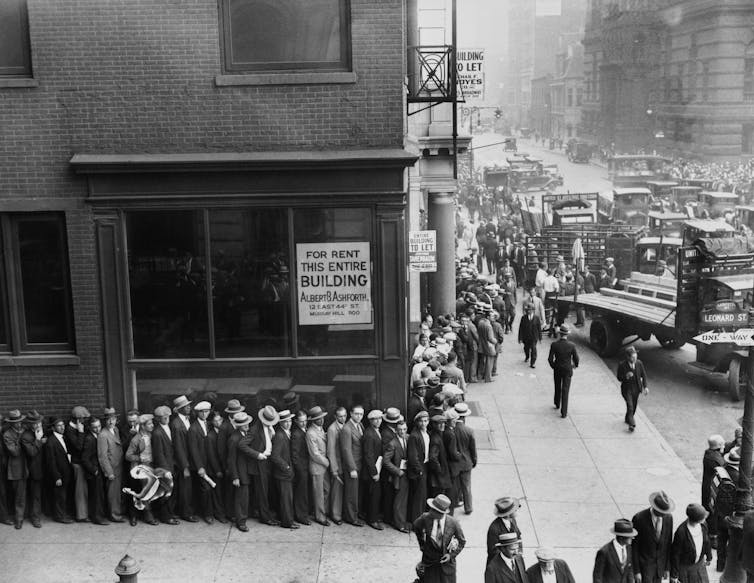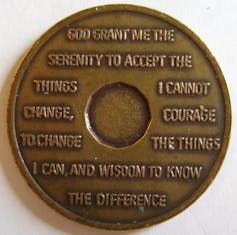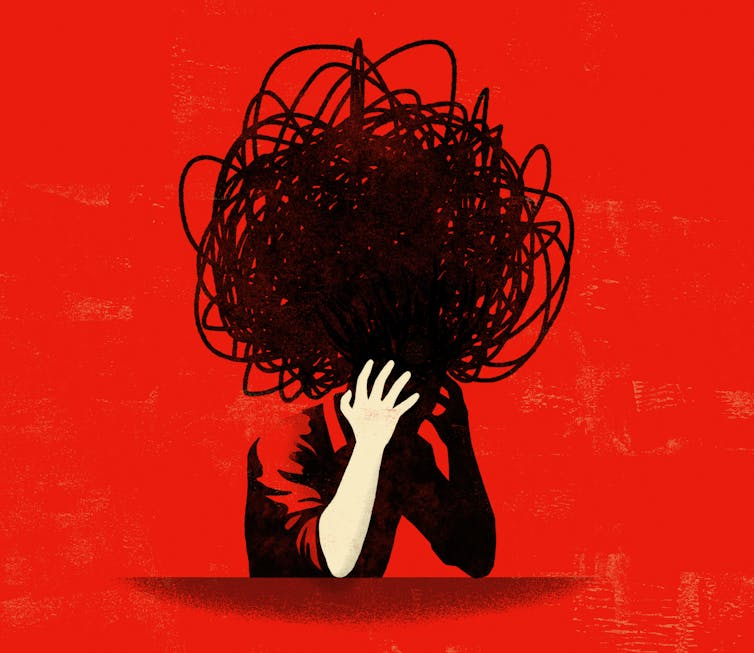Feeling political distress? Here are coping strategies a psychologist shares with his clients
- Written by Jeremy P. Shapiro, Adjunct Assistant Professor of Psychological Sciences, Case Western Reserve University
 The polarized political climate is reflected in what drives some people to therapy.Microgen Images/Science Photo Library via Getty Images
The polarized political climate is reflected in what drives some people to therapy.Microgen Images/Science Photo Library via Getty ImagesI began practicing psychotherapy during the Reagan administration. Thirty years went by before distress about politics became a clinical issue for any of my clients.
I remember the moment it first happened: There was a long voicemail from a distraught woman requesting therapy for anxiety and depression in reaction to the 2016 presidential election of Donald Trump. I listened twice to make sure I hadn’t missed something. I hadn’t. There were no other issues. This woman wanted therapy for political distress.
That was a new one for me and every therapist I knew. But now I see no sign of this clinical challenge abating.
Political polarization in the U.S. is at the highest level ever measured. Growing majorities of both Republicans and Democrats say they consider members of the other party to be unintelligent, dishonest and immoral.
What I’m calling political distress is a bipartisan mental health problem. It is based on a belief that, because the country is in the hands of bad leaders, awful things might happen. Many people experience intense fear about what the other side might do. Both Republicans and Democrats have experienced this anguish, but it peaks at different times for the two parties, depending on who won the last election.
We psychotherapists like to base our interventions on research-based strategies that have been vetted in clinical trials or, if not that, at least strategies grounded in the clinical expertise of master therapists who wrote classic books. There’s none of that for how to deal with political distress.
But therapists cannot tell a client in distress that future research is needed before we can help. Instead, we pull from what is known about how best to handle related issues. Here’s the advice I’m sharing with my clients who are upset about the way the world is going.
Taking a longer view
Information about American history is relevant to political distress because, psychologically, people evaluate their situations by comparing them with anchors or norms. You compare current dangers and threats with what you’ve faced and survived in the past.
A Democrat comparing today’s United States with the country a decade ago may feel gloomy. But broader comparisons can produce a more grounded, calming perspective.
 The Great Depression in the 1930s came with massive unemployment; here, thousands of people in New York line up in hopes of a job.UPI/Bettmann Archive via Getty Images
The Great Depression in the 1930s came with massive unemployment; here, thousands of people in New York line up in hopes of a job.UPI/Bettmann Archive via Getty ImagesThe U.S. has faced major trials and tribulations over the course of its history. The country has proven itself to be a resilient democracy. Basic information about the Civil War, the Great Depression and World War II yields a sense that the present political moment is not the only perilous time our republic has ever faced.
Wisdom of the Serenity Prayer
God, grant me the serenity to accept the things I cannot change, the courage to change the things I can, and the wisdom to know the difference.
 Change what you can, recognize what you can’t.Jerry 'Woody'/Wikimedia Commons, CC BY-SA
Change what you can, recognize what you can’t.Jerry 'Woody'/Wikimedia Commons, CC BY-SAThe Serenity Prayer is an effective summary of research on coping. As I discuss in my book “Finding Goldilocks,” the well-known invocation identifies two basic strategies and tells you when to use which one. People need the strength to change what can be changed and the serenity to accept what cannot. Political distress, like many stressors, calls for a combination of both tactics.
Doing what you can means funneling political anxiety into political actions, including voting, volunteering, donating money and serving as a poll worker. Can one person’s actions make a difference? They can make one person’s worth of difference. You can’t do everything, but you can do something.
In addition, taking action about a problem, even if it does not produce a solution, often reduces distress, especially if it brings you together with like-minded people.
Once you’ve done what you can, it’s important to acknowledge how much is beyond your control: The whole world doesn’t rest on your shoulders alone. Then you can in good conscience turn your attention to the good things in your own personal life.
It helps to limit your consumption of political news; past a certain point, you’re not learning anything new and just fueling your agitation.
 Imagining the worst can be a first step toward moving past anxiety.rob dobi/Moment via Getty Images
Imagining the worst can be a first step toward moving past anxiety.rob dobi/Moment via Getty ImagesThe best things in life aren’t political
One basic tool of cognitive therapy for anxiety is asking the question, “What is the worst thing that could plausibly happen?” The purpose of this question is not to get anxious people thinking about worst-case scenarios – they’re doing that already – but to move their thought process forward to a picture of how they could survive their worst fear. This is a strangely effective form of reassurance.
Democrats believe Donald Trump’s second administration will hurt people. But with important exceptions – such as undocumented immigrants who could be deported – when many people try to picture exactly how their lives will be damaged in specific, concrete, serious ways, they usually do not come up with much.
This does not mean nothing bad will happen. It does mean you likely can cope with whatever does. While Trump’s policies might be unfortunate and even infuriating for those on the other side of the aisle, they are unlikely to be disastrous on an immediate, day-to-day level for large groups of people.
A very broad perspective will remind you that democracy is a rarity in world history. For most of civilization, people have lived in monarchies or tyrannies of some sort, and most of them managed to be OK.
I’m not suggesting that people disengage from the political world. I believe it’s important to stand up for what you believe is right. My advice is not to put on your rose-colored glasses and withdraw into your own safe space, the rest of the world be damned.
But the main sources of human well-being are family, friends, meaningful work, hobbies, the arts, nature, spirituality and acts of kindness. None of these depend on political systems. We can cope with political distress by falling back on the best things in life.
Jeremy P. Shapiro does not work for, consult, own shares in or receive funding from any company or organization that would benefit from this article, and has disclosed no relevant affiliations beyond their academic appointment.
Authors: Jeremy P. Shapiro, Adjunct Assistant Professor of Psychological Sciences, Case Western Reserve University

